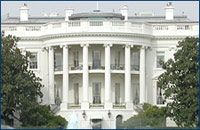“The Power That I Have On You Is To Spare You”
 While instant messaging a high school friend yesterday, she mentioned that she had just seen the final episode of The West Wing on DVD (in which outgoing president Josiah Bartlett pardons ex-Director of Communications Toby Ziegler from a conviction for leaking national security secrets to The Washington Post), and then linked me to a recent Slate article handicapping President Bush’s potential pardons, while commenting that “maybe if Bush was more like Bartlett, he wouldn’t have to pardon so many of his cronies.” I commented that President Clinton (and most other presidents) have done the same thing, which caused her to rephrase her statement by replacing “Bush” with “all the real presidents.”
While instant messaging a high school friend yesterday, she mentioned that she had just seen the final episode of The West Wing on DVD (in which outgoing president Josiah Bartlett pardons ex-Director of Communications Toby Ziegler from a conviction for leaking national security secrets to The Washington Post), and then linked me to a recent Slate article handicapping President Bush’s potential pardons, while commenting that “maybe if Bush was more like Bartlett, he wouldn’t have to pardon so many of his cronies.” I commented that President Clinton (and most other presidents) have done the same thing, which caused her to rephrase her statement by replacing “Bush” with “all the real presidents.”
I know: there are any number of things lame duck presidents can do that should probably be reviewed and reconsidered before we get to presidential pardons. I also understand that the pardon is a valuable tool that allows the executive branch to swiftly undo so-called “travesties of law,” setting free the wrongly convicted. Yet the Slate article got me thinking about whether it isn’t worth considering a check on this particular executive power sometime soon, both on a state and federal level (though the misuse tends to be more egregious on the federal level).

